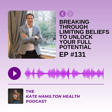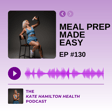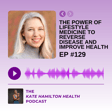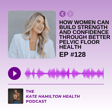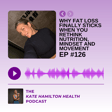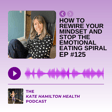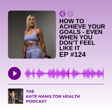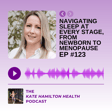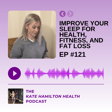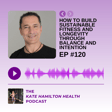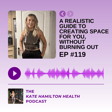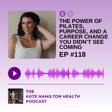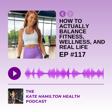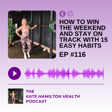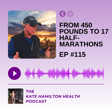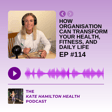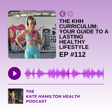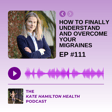
#113: Orla Power: How to build lasting health habits at every life stage
In this episode of The Kate Hamilton Health Podcast, I’m joined by the incredible Orla Power - a health, fitness, and lifestyle coach with a passion for helping women, especially during the pre and postnatal phases. Orla’s journey is one of powerful transformation, from working as a hairdresser to building a thriving online coaching business that empowers women to take control of their health, even amidst the chaos of motherhood and major life transitions.
We dig deep into what it really takes to create lasting, sustainable health - beyond the quick fixes and diet culture nonsense. Orla shares practical strategies around nutrition, why a calorie deficit isn’t a one-size-fits-all solution, and how hormonal shifts in postpartum and perimenopause impact weight loss. We also talk about mindset, limiting beliefs, and the small but consistent steps that lead to true change. If you’ve ever felt overwhelmed by trying to balance it all, this conversation is packed with real talk, relatable moments, and actionable advice to help you move forward with confidence.
EPISODE HIGHLIGHTS:
[00:00] - Meet Orla Power: From hairdressing to online coaching during the pandemic
[00:45] - Shifting from in-person PT to building a thriving virtual wellness business
[12:13] - Why nutrition matters more than perfection - and busting diet culture myths
[23:16] - Calorie deficit 101: What you really need to know about tracking
[28:10] - Rewiring your mindset: How beliefs can hold you back (and how to change them)
[29:12] - The weight loss struggles of women in their 50s - and how to support them
[30:25] - Supporting pre and postnatal women with realistic, holistic coaching
[35:46] - Weight loss vs. fat loss: What’s the difference and why it matters
[39:17] - Hormones, aging, and health: How your body changes over time
[43:30] - Finding balance: Setting fitness goals while managing life’s daily demands
[46:40] - Simple lifestyle shifts that lead to better health and more energy
[52:21] - Redefining what health and longevity truly mean for women today
Links & Resources:
- Connect with Orla on Instagram here
If you enjoyed this episode, please subscribe, leave a review, and share it with friends who might benefit. For more health and fitness tips, follow me on Instagram and TikTok @katehamiltonhealth.
Music b LiQWYD Free download: hypeddit.com/link/xxtopb [http://hypeddit.com/link/xxtopb] Promoted by FreeMusicPromo [https://www.youtube.com/channel/UCbycji-eySnM3WD8mbxPUSQ] / @freemusicpromo
